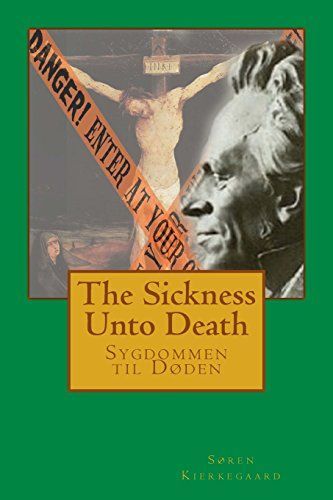
The Sickness Unto Death Sygdommen Til Doden
Anti-Climacus introduces the book with a reference to Gospel of John 11.4: "This sickness is not unto death." This quotation comes from the story of Lazarus, in which Jesus raises a man from the dead. However, Anti-Climacus raises the question: would not this statement still be true even if Jesus had not raised Lazarus from the dead? While the human conception of death is the end, the Christian conception of death is merely another stop along the way of the eternal life. In this way, for the Christian, death is nothing to fear. The true "Sickness unto Death," which does not describe physical but spiritual death, is something to fear according to Anti-Climacus. This sickness unto death is what Kierkegaard calls despair. According to Kierkegaard, an individual is "in despair" if he does not align himself with God or God's plan for the self. In this way he loses his self, which Kierkegaard defines as the "relation's relating itself to itself in the relation." Kierkegaard defines humanity as the tension between the "finite and infinite," and the "possible and the necessary," and is identifiable with the dialectical balancing act between these opposing features, the relation. While humans are inherently reflective and self-conscious beings, to become a true self one must not only be conscious of the self but also be conscious of being aligned with a higher purpose, viz God's plan for the Self. When one either denies this Self or the power that creates and sustains this Self, one is in despair. There are three kinds of despair presented in the book: being unconscious in despair of having a self, not wanting in despair to be oneself, and wanting in despair to be oneself. The first of these is described as "inauthentic despair," because this despair is born out of ignorance. In this state one is unaware that one has a self separate from its finite reality. One does not realize that there is a God, and accepts finitude because one is unaware of possibility of being more inherent in selfhood. The second type of despair is refusing to accept the self outside of immediacy; only defining the self by immediate, finite terms. This is the state in which one realizes that one has a self, but wishes to lose this painful awareness by arranging one's finite life so as to make the realization unnecessary. This stage is loosely comparable to Sartre's bad faith. The third type is awareness of the Self but refusal to submit to the will of God. In this stage, one accepts the eternal and may or may not acknowledge the creator, but refuses to accept an aspect of the Self that one in reality is, that is to say, the Self that one has been created to be. To not be in despair is to have reconciled the finite with the infinite, to exist in awareness of one's own self and of God. Specifically, Kierkegaard defines the opposite of despair as faith, which he describes by the following: "In relating itself to itself, and in willing to be itself, the self rests transparently in the power that established it."